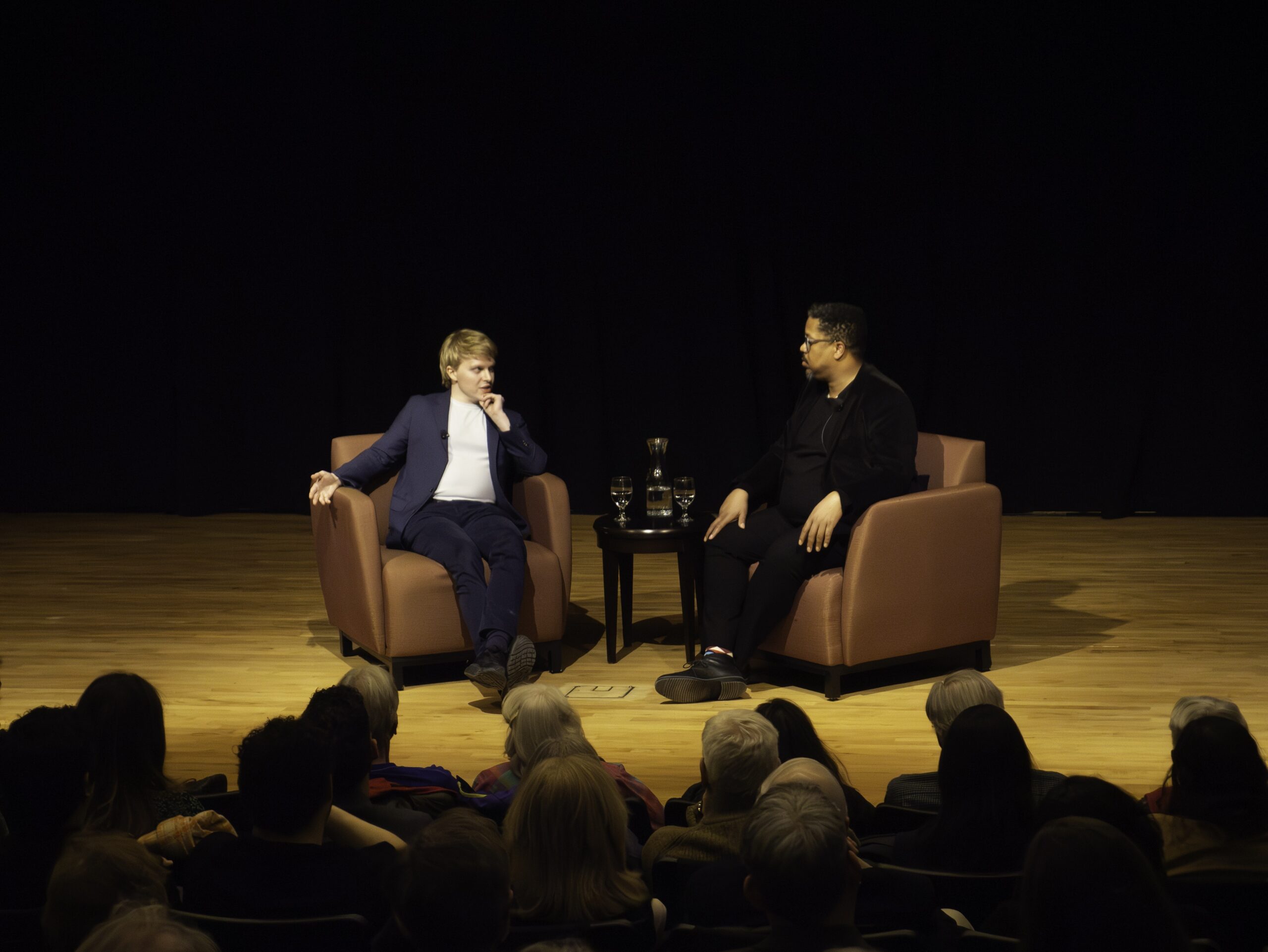“The Power of the Next Generation”: Ronan Farrow talks investigative journalism, media distrust, AI
February 14, 2025
 Isa Cruz
Isa CruzRonan Farrow graduated from college at 15, became a UNICEF ambassador before he was old enough to vote and entered Yale Law School before he was old enough to buy a beer. Now he’s turning to the next generation.
On Tuesday, the Pulitzer Prize-winning investigative journalist took the stage in Kresge Auditorium to deliver “The Power of the Next Generation,” a talk exploring the mounting precarity of the media industry and how young people, and young tech, are set to shape it. Professor of Sociology Theo Greene moderated the discussion, which was sponsored by the Tom Cassidy Lecture Fund.
Farrow is best known for his bombshell investigative reporting. He’s reported on sexual assault allegations against Harvey Weinstein, Britney Spears’ highly public conservatorship and spyware technology. He’s authored two books, including 2019’s “Catch and Kill,” documenting the Weinstein investigation. He also led a successful career in policy, serving as a special adviser on Afghanistan and Pakistan to the Obama administration. And he attended Oxford as a Rhodes Scholar.
Farrow reflected on a childhood he jokingly compared to “Doogie Howser,” marked by precociousness and ambition. He realized at a young age that he valued both creativity and public service—a combination that led him to journalism.
“How can I use something that’s sort of intellectually stimulating or serious or satisfies my sense of curiosity, something that gives back, and then also something that’s a little rooted in narrative or storytelling?” he recalled asking himself. “And honestly, I don’t know, I looked at Diane Sawyer, and I was like, ‘She’s hot and blonde.’”
Farrow spent his early career on the cable news circuit, leading a segment on the Today Show and reporting on geopolitics for CNN International, an enterprise he called “very nerdy”. As the constraints of the television format drove him toward print media, he also grappled with his newfound maturity, both personally and professionally.
“I really had to … get out of a posture of relentless careerism and ambition and go through a lot of pain and low points to grow personally,” he said. “I do think that growth often comes from moments of devastation where you have to rebuild, so I’m careful to not fetishize youth in that way.”
Journalism, Farrow said, is also in need of rebuilding. He cautioned about the low-trust and low-access media environment in the United States, where trust in the media is at an all-time low, disinformation abounds and millions of Americans find themselves without a local news source. Outlets are scrambling to adapt or shuttering altogether.
“It’s a scary time for this profession and for our democracy,” he said. “The specific subset of that problem that I focus on in my work—maintaining the free flow of information to create an informed public that can exercise autonomy, independent thinking and self determination—is particularly imperiled.”
He listed among the reasons for the decreasing trust in media the “failed experiment” of cable news, a format he said invites polarization and partisanship.
“The bold descent into partisan opinion journalism dominating cable over recent decades has eroded a lot of the expectation that the news media can actually provide meaningful, deep investigative insights and unearth facts without political motive behind it,” he said.
Public distrust in the media, he said, is also intentionally cultivated as an instrument of authoritarianism. He pointed to platforms like Meta and X, where the unfolding erosion of user content regulations is allowing disinformation to snowball.
“We see right now a kind of a rising oligarchy that is seeking to press further in that direction,” he said. “You look at Mark Zuckerberg gleefully dismantling any kind of fact-checking apparatus on his systems. You look at everything that Elon Musk is doing. The flourishing of misinformation is a deliberate agenda item in how he’s built his takeover of Twitter.”
Farrow noted that disinformation thrives in our modern, highly factionalist internet landscape—one that both breeds fierce ideological and pop-cultural contingents and hands them the tools to mobilize.
But Farrow sees the cycle of online hostility and skepticism as far from immutable.
“I think people are open, and most people are not as unkind as the fun house mirror of the internet makes them seem,” he said. “I think we all have an opportunity to break through to those people.”
For Farrow, the answer to the crisis is an economically sustainable model for delivering quality, factual reporting—a case he said the industry’s still cracking. He said there’s much to be learned from newer platforms like TikTok, a disinformation hotbed that has also revealed a promising public interest in creating and consuming fact-based “explainer” content. He identified artificial intelligence as a similarly double-edged sword, with the potential to both revolutionize and complicate ethical news coverage.
Farrow finds faith in speaking to young, aspiring journalists hoping to “shake things up.”
“I have a lot of fear about the future of the profession but also a lot of hope, because I do think it’s going to be one of the things that pulls us out of tearing at each other and burning down our country,” he said.

Comments
Before submitting a comment, please review our comment policy. Some key points from the policy: